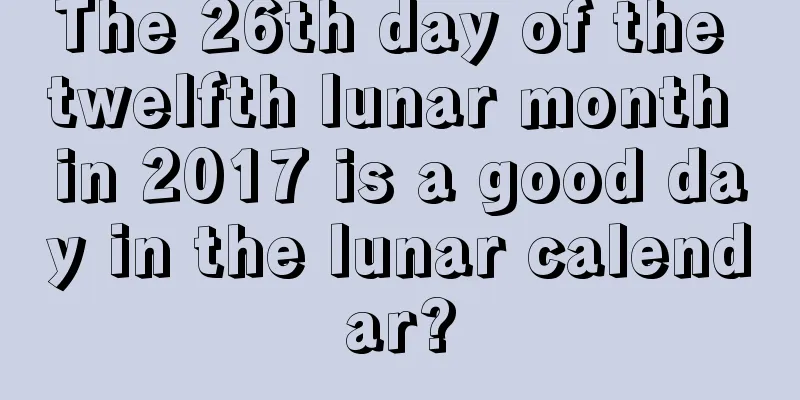What is the origin of the Spring Equinox? What are the characteristics of solar terms?

The fourth solar term of the 24 solar terms, the Spring Equinox, falls on March 21, marking the middle of the Spring Festival, when day and night are of equal length. It is a traditional solar term in my country and also one of the solar terms that reflects the changes of four seasons in my country. Generally, when the spring equinox comes, the weather starts to get warmer. So what is the origin of the spring equinox? What are the characteristics of solar terms? Months are divided into lunar calendar and solar calendar. The weather in the second month of the lunar calendar begins to become bright and people begin a new life and work. Pay attention to the special topic of February of the lunar calendar in 2020 on Shuimoxiansheng.com to check the different fortunes for each day!Origin of the Spring EquinoxThe Spring Equinox is the midpoint of the ninety days of spring. One of the 24 solar terms, it occurs around the 15th day of the second lunar month (approximately March 20-21 in the Gregorian calendar) when the sun is at 0° of the ecliptic longitude (the vernal equinox). On the day of the vernal equinox, the sun shines directly on the earth's equator. The seasons in the northern and southern hemispheres are opposite. In the northern hemisphere, it is the vernal equinox, and in the southern hemisphere, it is the autumnal equinox. The Spring Equinox is the New Year in Iran, Türkiye, Afghanistan, Uzbekistan and other countries, and has a history of 3,000 years."Collected Explanations of the Seventy-two Seasons of the Lunar Calendar" states: "In the middle of February, the word fen means half, which corresponds to the middle of a ninety-day period, so it is called fen. Autumn has the same meaning." "Spring and Autumn Fanlu: Yin Yang Out and In, Parts 1 and 2" states: "The spring equinox is when yin and yang are half and half, so the day and night are equal and the cold and heat are balanced." The Spring Equinox is also a festival and sacrificial celebration. Ancient emperors had the ritual of worshiping the sun in spring and the moon in autumn. The Emperor of Zhou Dynasty offered sacrifices to the Sun at the Sun Altar. "Collected Explanations of the Seventy-two Seasons of the Lunar Calendar" states: "In the middle of February, the equinox means half, which is half of the ninety days, so it is called the equinox." Another book in "Spring and Autumn Annals: Yin and Yang Out and In, Parts 1 and 2" states: "The spring equinox is when yin and yang are half and half, so the day and night are equal and the cold and heat are balanced." In folk activities, it is generally regarded as the official start of outing. Activities include: flying kites. Women and children fly kites and write blessings on the kites in the hope that the gods in heaven will see them. Wearing flowers in one's hair while drinking wine, men, women, young and old all wear flowers in their hair. Picking wild vegetables in the wild, Zhu Shuzhen's "Ten Poems on Spring Days": I have no mood to write or play the piano, and I am not in the mood to go outing and pick vegetables. Characteristics of the Spring EquinoxOn the day of the vernal equinox, the sun shines directly on the equator, and the day and night are almost equal. Afterwards, the position of direct sunlight gradually moves northward, and the days begin to get longer and the nights shorter.The farther away from the equator on the earth, the smaller the solar altitude angle at noon and the less solar heat received. Generally, March, April and May are spring in the Northern Hemisphere and autumn in the Southern Hemisphere. The East Asian trough has weakened significantly, and the activity of the trough and ridge in the westerly belt has increased significantly. Low pressure activities and cyclone development are common from Mongolia to the Northeast. The movement of low pressure guides the cold air southward, and the northern region is prone to strong winds and sandstorms. When the long wave trough moves eastward, affected by the convergence of cold and warm air masses, continuous rain and late spring cold weather will occur. |
Recommend
Is the eighth day of the first lunar month in 2020 a suitable day to pray?
Is the eighth day of the first lunar month in 2020...
Is it a good idea to pick up a new car on February 25th of the lunar calendar in 2022? What should you check when picking up a new car?
Red apricot flowers bloom in February, so it is ca...
Would it be a bad idea to hold a funeral on the 13th day of the seventh lunar month in 2021? What should you pay attention to during a funeral?
Funeral is a very particular matter, and the choic...
Is July 12, 2020 an auspicious day for funerals? Check the auspiciousness and inauspiciousness of August 30!
Introduction: Funerals generally require an auspic...
2022 Spring Festival Greetings, What Should You Send on WeChat on the Spring Festival?
Li means beginning; Chun represents spring. What b...
What is the fate and fortune of a girl born on April 19th of the lunar calendar in 2021?
People born in April are generally popular and lik...
Is the 14th day of the first lunar month in 2020 an auspicious day for marriage? Can I get engaged and hold a wedding?
Getting married, getting engaged, and holding a w...
Are boys born on the fifth day of the fifth lunar month in 2018 unlucky?
The fifth day of the fifth lunar month every year ...
Will the Civil Affairs Bureau be open on the fifth day of the first lunar month in 2022? When is the best time to get the certificate?
The Civil Affairs Bureau is also closed during the...
Is it okay to travel on the eighth day of the first lunar month after the rain in 2021? Is the eighth day of the first lunar month the Spring Festival?
Introduction: It is generally necessary to choose ...
Can I have a haircut during Bailu in 2021? What solar term is Bailu?
The withered lotus leaves sparkle with jade-like l...
Is it a good idea to open on May 1, 2020, Labor Day? On which day of Labor Day 2020 will overtime pay be tripled?
Introduction: It is very important to choose an au...
Is it okay to advance or postpone visiting graves during the Ghost Festival? What are the customs of visiting graves during the Ghost Festival?
The Zhongyuan Festival is also known as the Ghost ...
Is July 27th of the lunar calendar 2020 a good day for a haircut?
In life, when it comes to haircuts, people only ge...
Is the Mid-Autumn Festival suitable for traveling? Where to go during the Mid-Autumn Festival?
With the convenience of transportation, many peopl...









